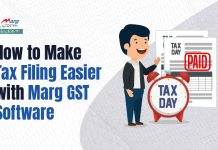Goods and Services Tax (GST) is a single tax system that has replaced all other indirect taxes in India. This has resulted in the simplification of tax compliance for businesses, as well as the reduction of tax evasion. GST accounting in Sikkim is similar to that in other states in India. In this blog, we will discuss the various aspects of GST accounting in Sikkim.
GST Registration in Sikkim
Businesses with an annual turnover of more than Rs. 40 lakhs must register for GST in Sikkim. For businesses operating in the North-Eastern states of India, including Sikkim, the turnover limit is Rs. 20 lakhs. It is mandatory for businesses to register for GST within 30 days of their turnover crossing the prescribed limit.
Once registered, businesses are provided with a GST Identification Number (GSTIN), which is a 15-digit alphanumeric code. GSTIN is a unique number that helps the government track transactions and ensure tax compliance.
GST Returns in Sikkim
Businesses registered under GST in Sikkim are required to file regular GST returns. The frequency of filing GST returns depends on the turnover of the business. Businesses with a turnover of up to Rs. 5 crores can file quarterly returns, while those with a turnover above Rs. 5 crores must file monthly returns.
GST returns can be filed online through the GST portal. The following are the different types of GST returns:
- GSTR-1: This return must be filed by businesses to report their outward supplies. It includes details of sales made during the reporting period, along with the tax collected on these sales.
- GSTR-2A: This is an auto-generated return that provides details of the inward supplies received by the business. It is generated based on the GSTR-1 filed by the supplier.
- GSTR-3B: This return is a summary of the sales made and the purchases made by the business during the reporting period. It also includes the tax liability and the tax paid by the business.
GST Payment in Sikkim
Businesses registered under GST in Sikkim must pay their tax liability online through the GST portal. The payment can be made through various modes, including net banking, debit card, and credit card.
Late payment of GST attracts interest at a rate of 18% per annum. Businesses that fail to pay GST for a continuous period of six months can have their GST registration cancelled.
GST accounting in Sikkim also involves understanding the various GST rates and how they apply to different goods and services. GST has four slabs: 5%, 12%, 18%, and 28%. In addition, certain goods and services are exempted from GST or fall under the 0% tax bracket.
It is important for businesses to correctly classify their goods and services under the appropriate GST slab to ensure the correct tax liability is calculated. The GST system also allows for input tax credit, where businesses can claim a credit for the tax paid on their purchases against their tax liability on their sales.
The GST system has also introduced e-way bills for the movement of goods from one state to another. E-way bills are generated electronically and must be carried with the goods during transit. It is mandatory for businesses with a turnover of over Rs. 50 lakhs to generate e-way bills for the movement of goods.
Overall, GST accounting in Sikkim requires businesses to maintain accurate records of their transactions, file their returns on time, and pay their taxes correctly. Non-compliance with GST regulations can result in penalties and legal consequences, which can be avoided through proper GST accounting practices.
GST accounting in Sikkim also involves compliance with various other regulations, such as the anti-profiteering provisions. These provisions require businesses to pass on the benefits of reduced tax rates to their customers by reducing the prices of their goods and services. Failure to comply with the anti-profiteering provisions can result in penalties and legal consequences.
Additionally, GST accounting in Sikkim requires businesses to maintain proper records of their invoices, credit notes, and debit notes. These records must be kept for a minimum of six years from the end of the financial year in which they were created. Failure to maintain proper records can result in penalties and legal consequences.
Businesses must also ensure that their GST returns are accurate and complete. In case of any errors or omissions in the returns, businesses can rectify them by filing a revised return within a specified period.
Moreover, businesses operating in Sikkim must also comply with the state-specific GST regulations. For instance, certain goods and services may be exempted from GST in Sikkim based on state-specific policies.
Conclusion
GST accounting in Sikkim requires businesses to comply with various regulations, maintain accurate records, and file their returns on time. The implementation of GST has simplified tax compliance and improved tax administration in India. However, businesses must remain vigilant and ensure compliance with GST regulations to avoid penalties and legal consequences.
Other Related Blogs: Section 144B Income Tax Act






